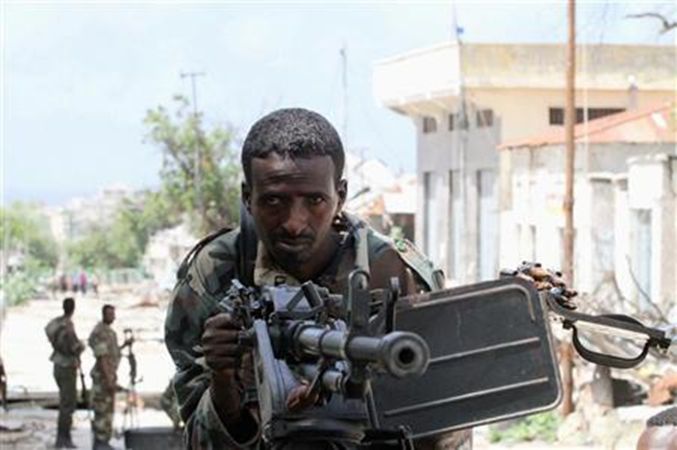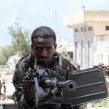
Somalia’s Famine Contributes to Popular Revolt against al-Shabaab Militants
Publication: Terrorism Monitor Volume: 9 Issue: 32
By:

Somalia’s drought and famine have slowed the progress of al-Shabaab operations in Somalia as people continue to flee from areas of southern Somalia under the movement’s control. These areas also happen to be the regions hit hardest by the growing shortages of food and water. The drought has likely played an important role in provoking al-Shabaab’s unexpected military withdrawal from the Somali capital of Mogadishu on August 6.
Hundreds of internally displaced people (IDPs) fleeing from the al-Shabaab-controlled regions of Lower Shabelle, Middle Shabelle, Bay and Bakool arrive in Mogadishu daily to get assistance from government and international aid agencies. International aid agencies are forbidden to operate in areas under al-Shabaab administration. More than 1,300 refugees arrive daily at the Dadaab camp, the world’s largest refugee camp in Kenya’s North-Eastern Province. Up to 2,000 other Somali refugees cross the border into Ethiopia every day (Reuters, July 28).
The refugees from insurgent-held areas are mostly farmers and herders who were a major source of income to fuel al-Shabaab’s operations against the Transitional Federal Government (TFG) and the African Union’s peacekeeping force, AMISOM (African Union Mission in Somalia). The al-Shabaab extremists used to take the people’s hard-earned income to pay for their arms and ammunition as well as salaries for their fighters. These depredations became too much to bear when combined with a devastating drought. Due to years of little to no rain the people have lost all of their livestock, their crops, and an ever increasing number of lives.
Al-Shabaab has come under pressure for relief from local communities under their rule, but has instead created only greater discontent by halting the work of international aid agencies in southern Somalia. Not only farmers and herders are leaving al-Shabaab controlled areas, but also the young men who might otherwise be recruited to the movement.
In disallowing international aid agencies the opportunity to help locals, al-Shabaab leader Shaykh Ahmed Abdi Godane “Abu Zubayr” has enforced his will despite the bitter disagreement of al-Shabaab commanders from the most affected areas of southern Somalia. According to Somalia author and politician Ahmed Shaykh Ali, the commanders of the most-affected drought areas are now at risk of a revolt against the leader of al-Shabaab which could result in the loss of even more territory and the revenues that could be accrued from them.
Ahmed Shaykh Ali told Jamestown that the beginnings of a popular revolt have already been seen in the areas around Mogadishu, the Lower and Middle Shabelle regions as well as some towns in central Somalia. [1]
On July 24, Somali pastoralists and al-Shabaab fought in the Jazira region located on the outskirts of Mogadishu. The Somali government is attempting to benefit from conflicts between local residents and al-Shabaab by sending soldiers to reinforce the locals. Al-Shabaab, however, has countered by sending reinforcements from the Middle Shabelle region (Somalia Report, July 25). Only a day later, herders and farmers in the Marka district of the Middle Shabelle region refused to pay the taxes demanded by al-Shabaab, further threatening to fight the movement, which they accused of looting their properties. A similar confrontation occurred the same day in Laanta Buure, near the Afgooye District, 30 km southwest of Mogadishu (Radio Shabelle, July 27).
On July 27, residents in the Ad-Addey neighborhood of the Lower Shabelle region’s main town of Jowhar fought against al-Shabaab militias who had demanded funds and ordered them to forcefully surrender their youths as new blood in the war against the TFG and AMISOM in Mogadishu. Al-Shabaab’s militia in Jowhar ordered each family to surrender either a teenager or two camels to finance the group’s operation, but residents declined and took up arms against the militants. Business places in the city remained closed while armed residents and al-Shabaab took their dispute to the streets of Jowhar (Radio Muqdisho, July 6). Similar clashes are increasingly reported in recent weeks as al-Shabaab struggles to retain public support and assert its control over the territories it occupies.
In a message broadcast on a pro-Islamist radio station in Mogadishu, Godane said that infighting between al-Shabaab officers had contributed to the group’s recent losses and warned against division of the outlawed group into two parts. This radio message marked Godane’s first admission of the group’s failure and its internal divisions (Radio al-Furqaan, July 5).
“Several of our overall commanders, senior officials as well as intelligence officers were killed and many others injured in Mogadishu and other places. I believe these are the most important people in our group… I am so worried to see our fighters surrender in the fighting,” Godane said, adding “We all know that some people who claim to be in our group are betraying us by spying and sharing secrets with our enemy.”
However, the group’s other leaders have been working hard to regain the movement’s popularity through discussions with clan elders in southern Somalia and by recruiting youth to retain areas under al-Shabaab rule. In the first week of July, senior al-Shabaab commander Mukhtar Robow “Abu Mansur,” movement spokesman Ali Mahmud Raage and other al-Shabaab officials met with Robow’s Digil and Mirifle clan elders at Day-Nuunay in Baidoa in an attempt to improve relations with populations in areas hit hard by the drought. In the meeting, al-Shabaab officers who seemed to be admitting their wrongdoings asked elders and residents to forget al-Shabaab’s previous mistakes, but the elders openly declared that they were not interested in continuing to wage war in Somalia (Somalia Report July 6). In central Somalia, other officials are also busy meeting elders and locals to ask them to assist the group both financially and militarily, but the locals failed to support the group’s appeal.
Al-Shabaab’s attempts to rally Somalis behind the movement at a time when many are occupied in a grim struggle to survive a drought and a resultant famine partly caused by Godane’s stubborn refusal to allow the UN and other agencies to provide relief aid, have largely failed, leaving the future of the movement in question as the TFG begins to talk of extending its writ beyond Mogadishu.
Notes:
1. Author’s interview with Ahmed Shaykh Ali, author and politician, Nairobi, July 22, 2011.





